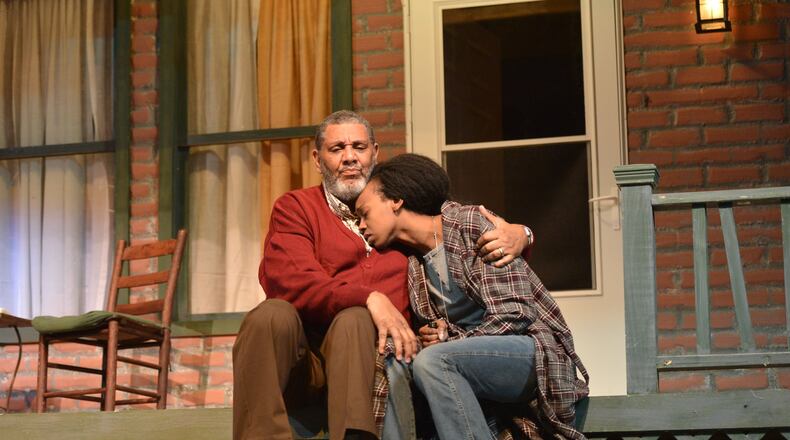THEATER REVIEW
“Proof”
Grade: B+
Through Nov. 20. 8 p.m. Wednesdays-Saturdays; 2:30 p.m. Saturdays-Sundays. $20-$60. True Colors Theatre. Southwest Arts Center, 915 New Hope Road, Atlanta. 1-877-725-8849, truecolorstheatre.org.
Bottom line: Solid though not quite as fresh as it once was.
David Auburn’s “Proof” (2000) is one of those smart, stark, fin-de-siecle dramas that captures a certain moment in time.
And yet, like Margaret Edson’s “Wit” and David Lindsay-Abaire’s “Rabbit Hole,” the four-actor play offers audiences a quick intellectual fix that may not be as clever or long-lasting as it first appears. Enough to both satisfy the public and impress awards committees alike, these urbane dramas, all three of which won Pulitzer Prizes, deal with death and dying.
How does time speed up, or slow down, or sit still when death is in the room? What is it like to lose a young child, or a parent, or yourself? What, as Edson and Auburn seem to inquire, is the cost of genius? Can the damage done obscure the pain, the sensitivity, the loneliness, the isolation?
"Proof," which Kenny Leon's True Colors Theatre has chosen to mount with a mixed-race cast, happened to arrive on the scene around the time I started reviewing theater. Seeing the play on Broadway, with Mary-Louise Parker as troubled math savant Catherine, then watching it again at the Alliance Theatre not long after, I found it brilliant and emotionally affecting.
Some 15 years later, I still think the play is moving and suspenseful, even if its core doesn’t feel as compelling as it once did. (A less generous person might declare this nail-biter gimmicky and pseudo-intellectual, or say the playwright has failed to live up to his potential since winning the Pulitzer and best-play Tony Award.)
Happily, director Tess Malis Kincaid has made an astonishing find in the person of Fedna Jacquet, who plays Catherine, a woman whose 25th birthday coincides with her father’s death, her sister’s homecoming, the promise of love — and maybe a little madness, too. We see in flashbacks that Catherine has taken care of her dad for years, postponing her own college education, possibly doing important work of her own.
“Proof,” you see, tries to romanticize higher math like “Wit” did John Donne. Catherine has been locked in the turret with her dad (Gerard Catus), a University of Chicago scholar who accomplished more in the field while still a young man than lesser minds might do in many lifetimes. We get this information in dribs and drabs, particularly from Hal (Eric Mendenhall), a former student who comes to sift through the papers of his old professor and ends up bedding his daughter.
Stirring the pot is Catherine's older sister, Claire (Tinashe Kajese-Bolden). Home from New York and newly engaged, Claire has clear plans for Catherine. Kajese-Bolden is quite good as the bossy big sister but not as fine as she was in "Disgraced," at the Alliance earlier this year. Would be fine by me if she arched it up a bit more.
Claire wants to sell her father’s house, and thanks to designers Mariah and Elizabeth Curley-Clay, it’s quite a shambles — an apt metaphor for a ruined mind. Catus gives an acceptable performance as the bumbling genius father, but his take on the character isn’t quite as fascinating and layered as others I’ve admired.
Mendenhall, whom I’ve mostly seen in overtly comic roles, does a nice job playing a person caught in the middle — to believe Catherine or not? (Though it’s certainly a convenient plot device, do decent people really go sifting through the files of a dead person before the body is buried?) At any rate, the romantic tension between Hal and Catherine feels real and authentic, perhaps because it’s done subtly.
In the end, True Colors manages to find some new layers of meaning in “Proof.” Whether it’s new to you or quite familiar, it’s worth checking out. To my mind, though, Jacquet is the main attraction, as a woman who must grieve for her father, figure out her feelings for a man and defend her sanity — all at once. In depicting the sorrow and the possibility of a young woman on the cusp of change, she’s very fine.
About the Author
Keep Reading
The Latest
Featured


